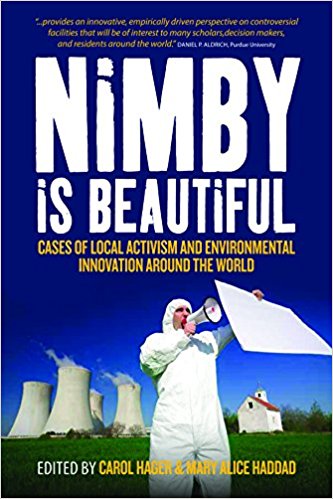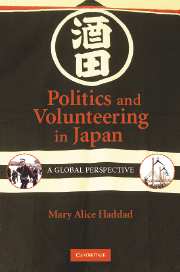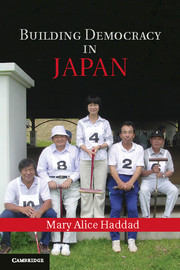I currently have three main, interconnected streams of research: Environmental politics, civic engagement, and urban studies.
Environmental Politics
My current book project, “Effective Advocacy: Lessons from East Asia’s Environmental Advocates,” examines the strategies that advocates in East Asia (Japan, mainland China, South Korea, and Taiwan) are using to persuade businesses, governments, and individuals in the region to behave in more pro-environmental ways. One co-edited book and several papers from this project have already come out, please see my SelectedWorks page to download them.
Carol Hager and Mary Alice Haddad eds. NIMBY is Beautiful: Cases of Local Activism and Environmental Innovation around the World (Berghahn Books, 2015 cloth, 2017 paper).
See also:
“Environmental Advocacy: Insights from East Asia,” Asian Journal of Political Science (November 2017) 25:3, pp. 401-419.
“Violent Repression of Environmental Protests” co-authored with Helen Poulos, SpringerPlus 5:230 (February, 2016).
“NIMBY is Beautiful: How Local Environmental Protests Are Changing the World” in Carol Hager and Mary Alice Haddad editors, NIMBY is Beautiful: Cases of Local Activism and Environmental Innovation around the World (Berghahn Books, 2015).
“From Backyard Environmental Advocacy to National Democratisation: The Cases of South Korea and Taiwan,” in Carol Hager and Mary Alice Haddad editors, NIMBY is Beautiful: Cases of Local Activism and Environmental Innovation around the World (Berghahn Books, 2015).
“Paradoxes of Democratisation: Environmental Politics in East Asia,” in Paul Harris and Graeme Lang eds. Routledge Handbook of Environment and Society in Asia. New York: Routledge, 2015, pp. 86-104.
“Media and Environmental Politics in East Asia,” in Zhiqun Zhu ed. New Dynamics in East Asian Politics, Continuum, 2012, pp. 170-188.
Related Projects
Related to my interest in environmental politics, in 2011 I began an EcoTools project that had two components:
1) Promoting green supply chains and green purchasing practices–ecopurchasing.wesleyan.edu; Presentations about this project have also been made in conjunction with our IT staff at NERCOMP. Click here for a video link.
2) Building an energy map of campus to promote sustainable practices on campus–ecomap.wesleyan.edu. I also collaborated with Second Nature to map key sustainability data for all of the campuses whose presidents are signatories of the American College and University Presidents’ Climate Commitment. That map can be found here.
Civil Society, Civic Engagement, and Democratization
Prior to to my current environmental project I worked on a books about volunteering, civic engagement, and democratization in Japan. Politics and Volunteering in Japan: A Global Perspective (Cambridge, 2007) explains variation in types and rates of volunteering across countries. Building Democracy in Japan explains Japan’s democratization process from a grassroots perspective. My current work continues to engage with questions of democracy, examining how democracy influences (and does not influence) the behavior of advocates seeking policy change.
See also:
“Environmental Advocacy: Insights from East Asia,” Asian Journal of Political Science (November 2017) 25:3, pp. 401-419.
“Japanese Democracy” in Tun-jen Cheng and Yun-han Chua eds. Routledge Handbook of Democratization in East Asia. New York: Routledge, 2017. pp. 40-52.
“From Backyard Environmental Advocacy to National Democratisation: The Cases of South Korea and Taiwan,” in Carol Hager and Mary Alice Haddad editors, NIMBY is Beautiful: Cases of Local Activism and Environmental Innovation around the World (Berghahn Books, 2015).
“Paradoxes of Democratisation: Environmental Politics in East Asia,” in Paul Harris and Graeme Lang eds. Routledge Handbook of Environment and Society in Asia. New York: Routledge, 2015, pp. 86-104.
“(Re)Creating Democracy through Practice: Insights from the Japanese Experience” in Adam White ed. The Everyday Life of the State: A State-in-Society Approach, University of Washington Press, 2013, pp. 159-179.
“The Transformation of Japanese Democracy” in Mary Malone ed., Achieving Democracy. New York: Continuum, 2011. pp. 195-218.
“Volunteer Organizations (Re)making Democracy in Japan.” in Alisa Gaunder ed., The Routledge Handbook of Japanese Politics. New York: Routledge, 2011. pp. 140-151.
“A State-in-Society Approach to the Nonprofit Sector: Welfare Services in Japan,” Voluntas: International Journal of Voluntary and Nonprofit Organizations (January 2011) 22:1, pp. 26-47.
“A New State-in-Society Approach to Democratization with Examples from Japan.” Democratization (October 2010) 17:10; pp. 997-123.
“From Undemocratic to Democratic Civil Society: Japan’s Volunteer Fire Departments” Journal of Asian Studies (February 2010) 69:1; pp. 33-56.
“Transformation of Japan’s Civil Society Landscape,” Journal of East Asian Studies (September 2007) 7:3; pp. 413-437.
“Civic Responsibility and Patterns of Voluntary Participation around the World” Comparative Political Studies (Dec. 2006) 39:10; pp. 1220-1242.
“Community Determinants of Volunteer Participation: The Case of Japan” Nonprofit and Voluntary Sector Quarterly (Sept. 2004); 33:8S-31S.
Civil Society and Civic Engagement
My first research project examined Japan’s volunteer participation and compared patterns of involvement to those found in other countries. I am now working on the connection between civic engagement and policy.
See also:
“Environmental Advocacy: Insights from East Asia,” Asian Journal of Political Science (November 2017) 25:3, pp. 401-419.
“From Backyard Environmental Advocacy to National Democratisation: The Cases of South Korea and Taiwan,” in Carol Hager and Mary Alice Haddad editors, NIMBY is Beautiful: Cases of Local Activism and Environmental Innovation around the World (Berghahn Books, 2015).
“Paradoxes of Democratisation: Environmental Politics in East Asia,” in Paul Harris and Graeme Lang eds. Routledge Handbook of Environment and Society in Asia. New York: Routledge, 2015, pp. 86-104.
“A State-in-Society Approach to the Nonprofit Sector: Welfare Services in Japan,” Voluntas: International Journal of Voluntary and Nonprofit Organizations (January 2011) 22:1; pp. 26-47.
“From Undemocratic to Democratic Civil Society: Japan’s Volunteer Fire Departments” Journal of Asian Studies (February 2010) 69:1; pp. 33-56.
“The Benefits of Volunteer Provision of Social Welfare Services and a Cautionary Note,” Re-public (November, 2010). Link
“Transformation of Japan’s Civil Society Landscape,” Journal of East Asian Studies (September 2007) 7:3; pp. 413-437.
“Civic Responsibility and Patterns of Voluntary Participation around the World” Comparative Political Studies (Dec. 2006) 39:10; pp. 1220-1242.
“Community Determinants of Volunteer Participation: The Case of Japan” Nonprofit and Voluntary Sector Quarterly (Sept. 2004); 33:8S-31S.









